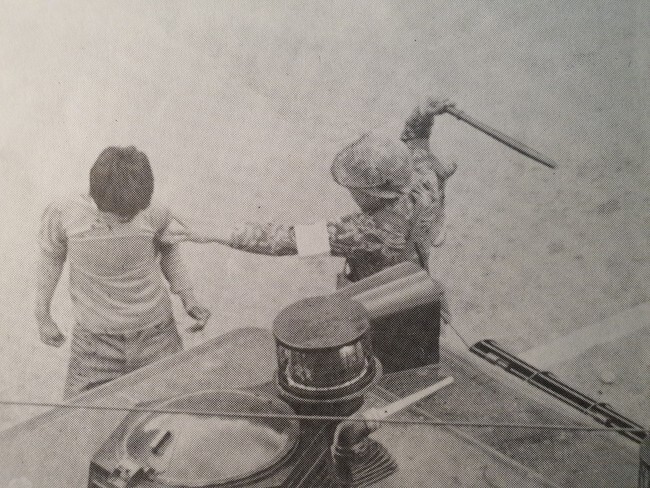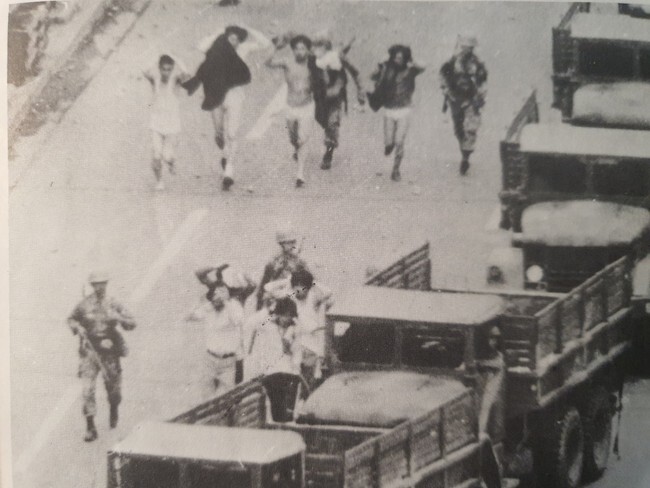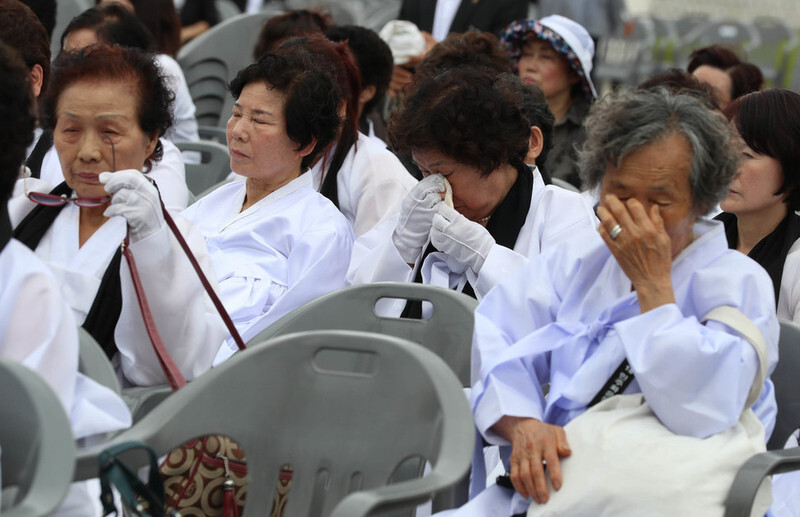hankyoreh
Links to other country sites 다른 나라 사이트 링크
[Interview] Spending 40 years caring for a son who was beat into a vegetative state by martial law troops

“Dear God, it’s been 40 years. What am I supposed to do? All I do is just care for my son.”
Ms. Park, an 89-year-old resident of the Gakhwa neighborhood in Gwangju’s Buk (North) District, let out a deep sigh when asked about her situation on May 4.
“I’m just disgusted about May 1980. I had a good husband, and he died after being beaten by martial law soldiers. They beat my son until he became crazy. I lost my house and everything.”
Her oldest son, a 57-year-old Buk District resident surnamed An, was a good student in the past. He was even more special for being the first son born to the couple after four daughters. An was a second-year student at a high school affiliated with Chosun University on May 21, 1980, when he came back from a field trip to shocking news. Someone had called to tell him that his father, who was a manager for an inter-city bus company, had lost consciousness after being beaten by a soldier in an airborne brigade.
Alarmed at the news, he was rushing to this father’s workplace when he was stopped by paratroopers in front of the main gate of Chonnam National University. He was struck on the head with a rifle butt and blacked out. When he came to, he was in a stranger’s home. He began speaking nonsense words; over time, his condition worsened. On Aug. 31 of that year, he was diagnosed with schizophrenia and took leave from his school. “My son was determined to hold out without going to the hospital, and I called the police to have him admitted.”
Park’s husband, who was born in 1928, also suffered aftereffects from his May 1980 experiences for the rest of his life. At around 1 pm on May 21 of that year, an airborne captain barged into the bus company’s garage accompanied by soldiers. They entered the office on the second floor, where they proceeded to brutally beat the husband and five of his coworkers with clubs and the butts of their guns. The husband lost consciousness and was taken to a hospital for treatment, but he continued to suffer problems throughout his life. For the five years until his passing in 2008, he lived in a vegetative state. The job of looking after their oldest son now falls on Park alone. Fortunately, her son can still recognize her.
“My son is turning 60 in two years. My biggest worry is passing away and leaving my son behind -- that's all.”

It has become common for May 1980 survivors with psychological problems to have to withstand the suffering on their own. One survivor surnamed Kim, who was born in 1958, was returning home early in the morning on May 20 after sleeping over at a friend’s house when she was seized by an armed paratrooper who threatened her before letting her go. Afterwards, she began experiencing odd symptoms. First admitted to a mental hospital in July 1982, she would subsequently visit different sanatoriums. During one of her brief stays at home in 1986, she got into an argument with her father over a trivial matter and threw a radio at him, killing him.

For 20 years, Kim has been undergoing treatment at Naju National (Psychiatric) Hospital. Her brother and sister-in-law died in a tragic accident, leaving her mother as her only refuge -- until she died as well.
According to statistics compiled by the 5·18 Bereaved Family Association, 65 people with psychological disorders in connection with the May 1980 Gwangju Democratization Movement remain alive, while another 61 have passed away. They are people who suffered psychological shock after being beaten or sexually assaulted by martial law troops.
“For the survivors with psychological disorders and their family members, May 1980 is still happening today,” said Jeong Su-man, former director of the 5·18 Bereaved Family Association, stressing the “need for measures for May 1980 survivors with psychological disorders and no family members to look after them.”
Many of the May 1980 survivors with psychological problems have taken their own lives. On May 27, 1987, Kim Yeon-ho, a 25-year-old who had been recognized as a person of national merit recognition in connection with May 1980, committed suicide by jumping in front of an incoming train.
By Jung Dae-ha, Gwangju correspondent
Please direct comments or questions to [english@hani.co.kr]

Editorial・opinion
![[Column] Has Korea, too, crossed the Rubicon on China? [Column] Has Korea, too, crossed the Rubicon on China?](https://flexible.img.hani.co.kr/flexible/normal/500/300/imgdb/original/2024/0419/9317135153409185.jpg) [Column] Has Korea, too, crossed the Rubicon on China?
[Column] Has Korea, too, crossed the Rubicon on China?![[Correspondent’s column] In Japan’s alliance with US, echoes of its past alliances with UK [Correspondent’s column] In Japan’s alliance with US, echoes of its past alliances with UK](https://flexible.img.hani.co.kr/flexible/normal/500/300/imgdb/original/2024/0419/2317135166563519.jpg) [Correspondent’s column] In Japan’s alliance with US, echoes of its past alliances with UK
[Correspondent’s column] In Japan’s alliance with US, echoes of its past alliances with UK- [Editorial] Does Yoon think the Korean public is wrong?
- [Editorial] As it bolsters its alliance with US, Japan must be accountable for past
- [Guest essay] Amending the Constitution is Yoon’s key to leaving office in public’s good graces
- [Editorial] 10 years on, lessons of Sewol tragedy must never be forgotten
- [Column] A death blow to Korea’s prosecutor politics
- [Correspondent’s column] The US and the end of Japanese pacifism
- [Guest essay] How Korea turned its trainee doctors into monsters
- [Guest essay] As someone who helped forge Seoul-Moscow ties, their status today troubles me
Most viewed articles
- 1[Column] The clock is ticking for Korea’s first lady
- 2[Correspondent’s column] In Japan’s alliance with US, echoes of its past alliances with UK
- 3Samsung barricades office as unionized workers strike for better conditions
- 4After 2 months of delayed, denied medical care, Koreans worry worst may be yet to come
- 5[Column] Has Korea, too, crossed the Rubicon on China?
- 6[Editorial] When the choice is kids or career, Korea will never overcome birth rate woes
- 7Hong Se-hwa, voice for tolerance whose memoir of exile touched a chord, dies at 76
- 8US overtakes China as Korea’s top export market, prompting trade sanction jitters
- 9Constitutional Court rules to disband left-wing Unified Progressive Party
- 10Nearly 1 in 5 N. Korean defectors say they regret coming to S. Korea